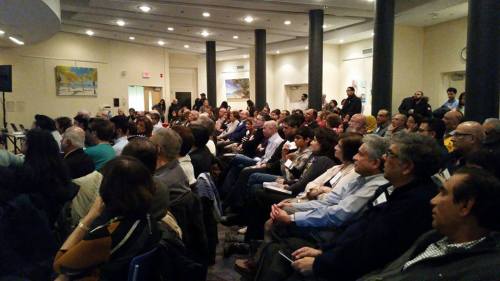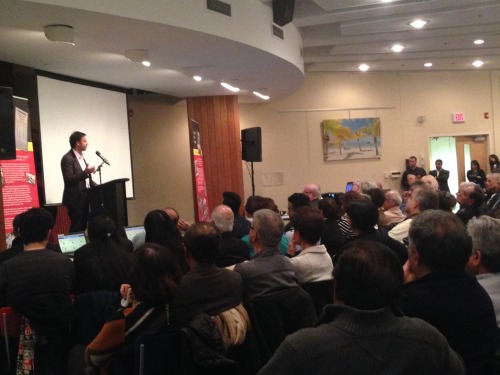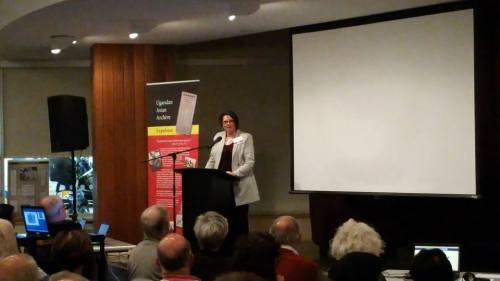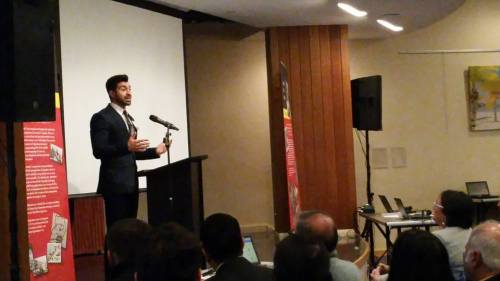by Shezan Muhammedi

On January 23rd 2016, over 200 people attended the “Ugandan Asian Archives Road Show” hosted by Carleton University at the S. Walter Stewart Library in Toronto. Members of the Ugandan Asian refugee community that came to Canada in the 1970s, after being expelled from their homeland by the military tyrant Idi Amin, filled the library’s auditorium beyond its capacity. The former president of Uganda had accused the Ugandans of South Asian descent of economic sabotage and a failure to integrate socially with African Ugandans. He also asserted that God had come to him in a dream and advised him to expel the Asians. They were given just ninety days to leave the country and were only permitted to take one suitcase and roughly 143 Canadian dollars with them.
Responding to the expulsion, the Canadian government resettled approximately 8,000 Ugandan Asian refugees in Canada between 1972 and 1974. An immigration team was sent directly to Kampala, Uganda to screen people and issue visas. Attendees included those who came directly from Uganda and others who were admitted to Canada subsequently from refugee camps in Europe.
The event in Toronto featured the entire collection from the Ugandan Asian Refugee Archives housed at Carleton University. Newspaper clippings from the Uganda Argus were shown as well as articles from Canadian and international newspapers. Additionally, there were several listening stations that showcased six oral histories collected from Ugandan Asian refugees who describe their life experiences in both Uganda and Canada. Beyond the excellent materials on display there were several prominent speakers who addressed various elements of the resettlement.

Two members of parliament, Yasmin Rattansi and Arif Virani, spoke of their ties to the Ugandan Asian refugee community in Canada. As the recently appointed parliamentary secretary for the Department of Immigration, Refugees and Citizenship, Mr. Virani explained his deep connection to the Ugandan Asian refugee experience as he was just 10 months old when he arrived in Canada as a refugee from Uganda in 1972. He outlined the realities of making Canada your home and the drive for Canadians to continue the excellent work they’ve done in the past and to extend it towards incoming refugee communities.
Wayne Jones, Patti Harper, and Heather Leroux spoke of their direct involvement with the Carleton Archive and their future plans for collecting more primary documents and material from Ugandan Asian refugees in conjunction with many more oral histories.

Mike Molloy, president of the Canadian Immigration Historical Society and one of the immigration officials on the ground in Kampala in1972, spoke of his time as one of the members of the dedicated and hard working team that sought to process applicants under the tight 90-day timeline. (At least four additional members of the original team attended the Toronto event). Molloy shared two anecdotes surrounding the 1972 Summit Hockey Series between the Soviet Union and Canada and its links to the arrival of the first of the refugees. There was an additional story of a particularly complex and dangerous screening process for a man who had been arrested by Ugandan authorities.
Nizar Fakirani, a lawyer based in Toronto, spoke on behalf of the Fakirani family who’ve been the principle donors to the archive at Carleton. He outlined how the experiences of his family encouraged them to help document the lives of other Ugandan Asian refugees as well as their own.
Tasneem Jamal, the author of Where the Air is Sweet read an essay she published in the Globe and Mail which described her grandfather’s life in both Uganda and Canada as a proud and courageous man.
Lastly, the event included a short presentation by PhD candidate Shezan Muhammedi, who is currently writing the first academic account of the Ugandan Asian resettlement in Canada. He mentioned that the oral histories he has collected with over 50 participants have revealed unique ways in which refugees transition to becoming active Canadians citizens who give back to society in numerous ways.

Ultimately, the Road Show brought together Ugandan refugees from various communities to share and celebrate their common experience. It served as an excellent opportunity for them to reflect on their life experiences and celebrate their transition to becoming active Canadian citizens. Furthermore, it demonstrated the ways in which immigrant and refugee communities hold a unique place in Canadian history and how they have contributed to society.
Through the Ugandan Asian Archive, Carleton University and its partners hope to promote the collection and preservation of the life stories of members of the first significant movement of non-European refugees to Canada and their subsequent contributions to this country. It is hoped that the Road Show can be taken to other Canadian cities.
Photos were provided graciously by Salim Nensi.